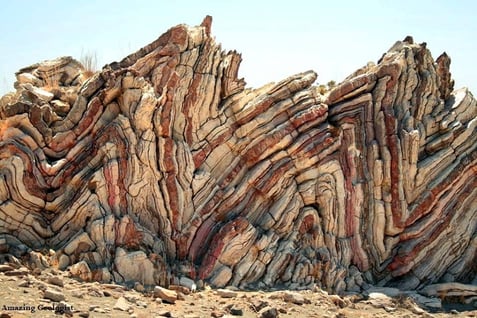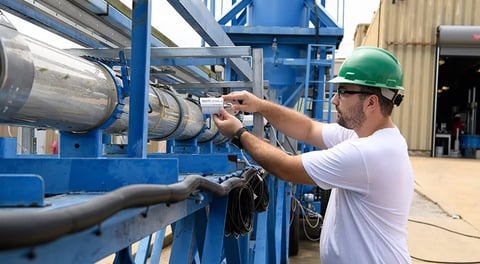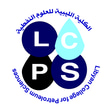Third Semester
Fundamentals of Electrical Engineering
Code :GS211 Unit : 6 Prerequisite : ES122
System of Units - Types of circuits and circuit elements - Ohms law Kirchhoff’s laws - Nodal analysis – Mech. analysis - Thevenins and Norton’s theorems - Inductance and Capacitance - The Sinusoidal for cingfunction - The phasor Concept - Sinusoidal Steady State response - Phasor Diagrams - Impedance - Admittance - Instantaneous , average, apparent, and Complex powers.


Applied Chemistry
Code : GS212 Unit : 9 Prerequisite : ES123
General Chemistry Basics: Mole & Avogadro’s Number- Oxidation –Reduction and Valency – Gas Laws – Dalton’s Law – Henry’s Law –Graham’s Law – Gay-Lussac’s Law – Raoult’s Law – Equilibrium and Lechatelier's principle. Physical Chemistry Concepts: Thermodynamics –Kinetics – Catalysis – Adsorption – Membranes. Colloid Chemistry Concepts: Colloidal Dispersion in Liquids and Air – Hydrophobic and Hydrophilic Colloids – Emulsions. Industrial Chemistry Concepts: Material Balances – Gases – Vapors – Liquids and Solids – Energy Balances Petroleum Chemistry Concepts: Formation and Existence – Chemical composition – Physical and Chemical Properties. Natural Gas Chemistry Concepts: Chemical and Physical Behaviors – Gas Laws – Chemical and Physical Properties. Chemical Process Thermodynamics’: Energy Relations and Balances – Free Energy and Entropy – Equilibrium Relations. Chemical Process Kinetics: Rates and Orders of Reactions – Kinds of Reactions –Reactor Design.


General Geology + Geological Laboratory
Code : PE213 Unit : 12 Prerequisite : ES122, ES123
Introduction to geology, definitions of geology and engineering geology,general outline of the structure of the Earth, most abundant elements and minerals of the crust. Magma, rock cycle, minerals, physical properties of minerals. Classification of minerals on basis of chemical composition. Rocks classification : Igneous rocks, sedimentary rocks, metamorphic rocks.External Processes of the Earth (Weathering- Erosion-Transportation -Sedimentation). Sedimentary Basins System - Sedimentary Environment(Aeolian System, Fluvial System, Deltaic). Introduction to simple geologic structures: fold, fault, joint and unconformity. Deformation and failure behavior of rocks and factors controlling these behaviors Minerals Identifications – Rocks Identifications – Contour Maps – Cross Sections – Fault Types – Fold Types – Dip and Strike – Stereo graphic Problems – Examination of Well Cutting – Thin Section Analysis – Well Correlation – Subsurface Mapping.


Applied Mechanics
Code : GS214 Unit : 9 Prerequisite : ES121, ES112
Statics: Basic laws and concepts of Mechanics - Force systems - The equilibrium of particles, rigid body and systems of rigid bodies - The internal forces of a straight beam - Strength of Materials: Basic concepts and constitutive equations of linearly elastic materials - Tension and compression of a straight bar - Shear and bending of a straight beam-Torsion and buckling of a bar - Dynamics: Plane kinematics and kinetics of a particle and a rigid body - Theorems of impulse and energy - Harmonic vibrations of single-degree-of-freedom systems.


Introduction To Petroleum Engineering
Code : PE215 Unit : 6 Prerequisite : -----
Origin, Chemical Composition, Migration, and Accumulation of Petroleum Subsurface Pressures and Temperatures - Petroleum Exploration Methods Basic Reservoir Rock Properties: Porosity, Permeability, Saturation, and Capillary Pressure - Properties of Gaseous Petroleum - Oil and Gas Reserves Calculations – Drilling Methods: Cable Tool and Rotary Drilling - Drilling Techniques: Vertical and Directional Drilling, Fishing Operations - Rotary Drilling Fluids - Well Completion Types - Well Logging - Production Methods.


Differential Equations
Code : GS216 Unit : 9 Prerequisite : ES121
Basic concepts - First-order differential equations - Equations of second order and higher order - Exact and inexact differential - Useful theorem of partial differentiation (wave equation, diffusion equation) - Boundary value problems - Series solutions - Some classical equations - System of first order equations - Laplace transform and operational methods - Simple numerical methods - Linear difference equations.


Technical English writing reports
Code : ES217 Unit : 1 Prerequisite : ES125
With this Technical Report Writing training course, you will gain the essential skills of producing technical reports of which you can be proud. Technical reports often present complex information to non-specialists. Their effectiveness depends as much on the quality of the writer’s ideas as on the accuracy of their information. An effective technical report displays complicated information in ways that make it easy to understand, and – above all – relevant to the reader. You will learn how to construct coherent arguments and explanations, and how to present information to support them. We shall look at how to offer complex material to support managerial and strategic decision-making. We shall work on how to make language work for us, and how to make reports look as good as they read. Throughout the course, we shall work directly with participants’ own reports. Working in English as a second or further language will be a reference theme throughout..


